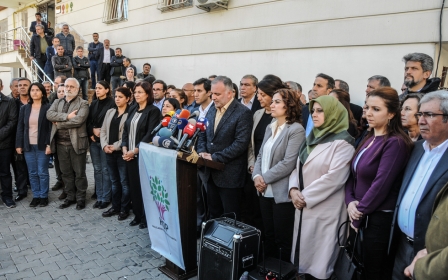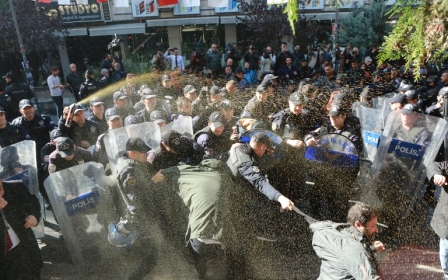Turkey summons EU ambassadors after wave of arrests criticised by Europe

ISTANBUL, Turkey – Turkey’s EU minister summoned the ambassadors of the bloc’s member states for a meeting on Monday to protest their condemnation of Turkey’s recent actions against pro-Kurdish politicians and opposition media, accusing the EU of inconsistent behaviour toward an ally.
“When it comes to Daesh [the Islamic State group] you create a global uproar. That is correct. Daesh is a bloody and vicious terrorist organisation.... but when it comes to the PKK you enter sympathy mode,” Omer Celik, Turkey's minister for EU affairs, said in a televised press briefing following the meeting.
Celik summoned the ambassadors after Turkey was strongly criticised by EU officials for the arrests last week of a dozen pro-Kurdish MPs and a raid against leading opposition newspaper Cumhuriyet and the arrest of nine of its staff.
He said it was politically unacceptable for politicians to constantly engage in “anti-Turkey actions” and that immunities were lifted for all MPs not just a select group. He also said people elected to office were obliged to remain within the limits of the law.
The 12 MPs from the Peoples’ Democratic Party (HDP), including its co-founders Selahattin Demirtas and Figen Yuksekdag, were forcibly removed from their homes and taken into custody on 4 November.
Turkish authorities said the raids and arrests were a result of these MPs ignoring a summons to appear in court and testify in cases where they are accused of aiding and abetting a terrorist organisation.
The Turkish government and President Recep Tayyip Erdogan view the HDP as the political extension of the PKK, or Kurdistan Workers’ Party. The PKK is designated as a terrorist group by Turkey, the US and the EU and is currently engaged in a campaign of violent attacks against civilian and military targets in Turkey.
The move to strip MPs of their immunity from prosecution while in office was introduced in parliament by the ruling Justice and Development Party (AKP) and passed in May. Erdogan signed it into law in August.
Government officials have dismissed claims that the HDP is being specifically targeted, saying it is a judicial process with no political dimension.
Celik also objected to a decision by the HDP to boycott parliament in protest at the arrests and said “no one should quit parliament”.
The reason for the raid and arrest of journalists from the secular leftist Cumhuriyet newspaper is cited as helping to promote the PKK and the Fethullah Gulen movement without actually being members of either group.
Authorities blame the US-based Turkish preacher Gulen and his followers of being behind a failed coup attempt on 15 July that resultedin 241 deaths.
Turkish authorities believe that its traditional Western allies in both the US and Europe failed to sufficiently condemn the coup attempt and that they also fail to grasp the threat posed by the Gulen movement.
Nazis 'apprentices compared to Gulen'
Celik was enraged by a statement from Luxembourg’s foreign minister claiming Turkey’s actions were worse than those perpetrated by the Nazis.
“Compared to FETO [Fethullah Terrorist Organisation, the term used by the government for Gulen’s movement] the Nazis are just apprentices. They are like primary school students [in comparison]. It is an organisation that has murdered its own nation with fighter jets and helicopters,” he said.
Despite the heated fallout over the arrests, Celik took a conciliatory note adding that it was time to strengthen ties between the EU and Turkey and said Ankara wouldn’t allow anyone to damage relations between the two.
He rejected calls by some European politicians to suspend EU accession talks with Turkey. "We do not want to cut ties with the EU. We want to establish stronger relations with Europe" Celik said.
“We can enter a new period with constructive criticisms and a positive agenda. No one should try to teach the other a lesson and wag fingers at each other. Let’s shake hands and continue discussions at the same table,” he said.
Meanwhile, a German newspaper reported that a European Commission report expected on 9 November will be the harshest yet against Turkey, slamming it for its record on press freedoms, human rights, the state of law and judicial independence.
Stay informed with MEE's newsletters
Sign up to get the latest alerts, insights and analysis, starting with Turkey Unpacked
Middle East Eye delivers independent and unrivalled coverage and analysis of the Middle East, North Africa and beyond. To learn more about republishing this content and the associated fees, please fill out this form. More about MEE can be found here.




